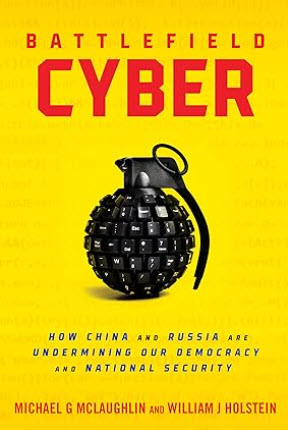Volume 23, Issue 1
Book Review by Mohammad Tasrif Khan
Authors: William J. Holstein and Michael G. McLaughlin
Publisher: Prometheus Books (The Rowman & Littlefield Publishing Group, Inc.)
Print ISBN: 978-1-63388-901-9
 In an era dominated by interconnected digital systems, the landscape of global conflict has expanded beyond conventional battlefields. The book Battlefield Cyber: How China and Russia Are Undermining Our Democracy and National Security, co-authored by William J. Holstein and Michael McLaughlin, provides a compelling exploration into the growing threats posed by cyber operations orchestrated by China and Russia. Through meticulous research and insightful analysis, the authors shed light on the multifaceted dimensions of cyber warfare, emphasizing its impact on democracy and national security.
In an era dominated by interconnected digital systems, the landscape of global conflict has expanded beyond conventional battlefields. The book Battlefield Cyber: How China and Russia Are Undermining Our Democracy and National Security, co-authored by William J. Holstein and Michael McLaughlin, provides a compelling exploration into the growing threats posed by cyber operations orchestrated by China and Russia. Through meticulous research and insightful analysis, the authors shed light on the multifaceted dimensions of cyber warfare, emphasizing its impact on democracy and national security.
The book commences with a stark assessment of the current state of cyber threats emanating from China and Russia. Holstein and McLaughlin draw on their collective expertise to present a detailed overview of the cyber capabilities wielded by these two nations. The authors examine the sophisticated tactics, techniques, and procedures employed by state-sponsored cyber actors, highlighting the evolving nature of cyber warfare and its implications for democratic institutions and national security.
A notable strength of Battlefield Cyber lies in its ability to navigate the complex intersection of geopolitics, technology, and cybersecurity. The authors adeptly unravel the historical context that has shaped the cyber strategies of China and Russia, providing readers with a nuanced understanding of the motivations driving their actions. The narrative skillfully weaves together the geopolitical ambitions of these nations with the evolving landscape of cyber capabilities, creating a comprehensive framework for analyzing the contemporary threat environment.
Holstein and McLaughlin delve into the methods employed by China and Russia to exploit vulnerabilities in democracies and compromise national security. The book meticulously explores the diverse range of cyber operations, from disinformation campaigns and election interference to the targeting of critical infrastructure. Through a series of well-researched case studies, the authors illustrate how cyber activities orchestrated by these nations have not only undermined democratic processes but have also posted significant challenges to the integrity of national security apparatuses.
One of the book’s key contributions is its examination of the economic dimensions of cyber warfare. Holstein and McLaughlin delve into the strategies employed by China and Russia to engage in economic espionage, stealing intellectual property and trade secrets from Western as well as Latin American nations (Klinger 2018). The authors analyze the economic motivations behind these cyber activities, shedding light on the broader implications for global economic stability and competitiveness.
The narrative maintains a balanced approach, acknowledging the need for a nuanced understanding of the motivations behind China and Russia’s cyber operations. While the authors critically assess the actions of these nations, they also emphasize the importance of avoiding a simplistic and one-dimensional view of the geopolitical landscape. This balanced perspective adds depth to the analysis, encouraging readers to consider the broader context in which cyber operations unfold.
An intriguing aspect of Battlefield Cyber is its exploration of the psychological dimensions of cyber warfare. Holstein and McLaughlin delve into the use of disinformation and psychological operations as tools to sow discord, manipulate public opinion, and erode trust in democratic institutions. The authors argue that understanding the psychological impact of cyber operations is crucial for developing effective countermeasures and safeguarding the democratic fabric of nations (Beauchamp-Mustafaga 2021)The book also tackles the inadequacies of existing international frameworks in addressing the challenges posed by state-sponsored cyber threats. Holstein and McLaughlin critically examine the limitations of traditional diplomatic and legal avenues in deterring for responding to cyberattacks. The authors advocate for a reevaluation of international norms and the development of collaborative mechanisms to enhance the resilience of democracies against cyber threats.
As the narrative unfolds, Holstein and McLaughlin address the role of private sector entities in the battle against cyber threats. The authors underscore the symbiotic relationship between government agencies and private corporations, emphasizing the need for greater collaboration in defending against cyberattacks. Through real-world examples, they highlight instances where public-private partnerships have yielded positive outcomes and propose strategies for further strengthening these alliances.
A commendable feature of the book is its exploration of the technological arms race in cyberspace. Holstein and McLaughlin discuss the rapid advancements in cyber capabilities, artificial intelligence, and other emerging technologies (Beauchamp-Mustafaga 2024) They analyze how these developments not only shape the offensive capabilities of China and Russia but also pose challenges for defenders in staying ahead of evolving cyber threats (Treyger, Cheraritch & Cohen 2022). This forward-looking perspective adds a layer of urgency to the book, urging policymakers and security practitioners to anticipate and adapt to the evolving nature of cyberwarfare.
Battlefield Cyber concludes with a reflection on the imperative for democracies to develop a comprehensive and adaptive approach to cybersecurity. Holstein and McLaughlin emphasize the need for a coordinated and multi-faceted strategy that encompasses technological innovation, policy reforms, international cooperation, and public awareness. The authors argue that only through a holistic and proactive approach can nations hope to safeguard their democracies and national security in the face of relentless cyber threats.
The Battlefield Cyber book has been released at a pivotal time where both China and Russia made their successful inroads toward building ties with long-term American allies in Latin America and other parts of the globe with strong American interests, thus representing a conflict of interest among the United States, China, and Russia. Cyberattacks have been escalating with great frequency and severity compared to the years between 2011 and 2019 leading up to the 2020-21 COVID-19 pandemic. As seasoned national security experts in the field of cyber and space operations, both Holstein and McLaughlin aim to bring forth extensive experience and meticulous research to construct a compelling narrative toward counterterrorism and reconnaissance efforts against cyber threats from adversarial powers in this ongoing global power competition (GPC). The authors further argue that both seek to undermine Western democracies, particularly the United States and its Western allies, through targeted cyber operations, to boost disinformation campaign efforts and to manipulate public opinion to weaken critical infrastructure systems that citizens heavily depend upon for their way of living (Roy 2022)This dual focus on technical tactics and strategic objectives from the Russian and Chinese angles have accelerated the overall interest an audience should be expecting to gather simply from reading this book.
Abstract threats become tangible through the authors’ inclusion of real-world examples because they recount cyberattacks on Sony Pictures, the Democratic National Committee during the 2016 elections, and the Colonial Pipeline incidents from the late 2010s. These examples further demonstrate the potential scope and devastating impact of such operations politically, socially, and economically, thus capturing the urgency of the situation across all domains, not just in cyber or space fronts (Treyger & Cohen 2022).Beyond raising awareness with regards to these Chinese and Russian inroads toward neutralizing American cyber supremacy, the book offers a roadmap for strengthening national defenses (Steir et al. 2024). The authors could have also highlighted additional sets of contextualized examples that demonstrate the magnitude of cyberattacks impacting the financial, medical, or healthcare and tech sector industries, such as pharmacies losing consumer data access at the hands of hackers between 2019 and the present, which would have further strengthened their case of argument in their literature review. For example, the authors recommend increasing public-private partnerships, enhanced intelligence gathering, and improved cyber resilience across both government and private sectors. At the end of the day, these concrete recommendations empower readers to engage in solving the issues that are at stake rather than admitting the issues upfront and not doing much to solve these issues, as increased people are being connected with interface technology systems daily. (Steier et al. 2024).
While the book effectively highlights the dangers posed by China and Russia, it could benefit from further nuance. Oversimplified portrayals of complex geopolitical relationships could potentially risk hindering a deep understanding for the audience and do not help the authors’ arguments. Indeed, addressing internal vulnerabilities and acknowledging the multifaceted nature of cyberspace might enrich the analysis. The primary focus on the American experience potentially limits the book’s global appeal because of the book’s U.S.-centric perspective with regards to space warfare (Steier et al. 2024) Exploring cyber threats against other democracies and offering comparative insights could broaden the scope and help the arguments resonate with a wider audience, especially in middle-power and lower-power countries from Africa and Asia. Moreover, the authors’ backgrounds and the book’s focus on specific adversaries, confirmation bias, and reasoning bias are the major forms of biases one should look out for consideration from one’s experience with the literature review presented in the book. Thus, acknowledging alternative perspectives and engaging with the point of views (POVs) from other external sources would be beneficial in strengthening the objectivity of this vital work.
Overall, Battlefield Cyber: How China and Russia Are Undermining Our Democracy and National Security stands as a thought-provoking and timely exploration of the challenges posed by state-sponsored cyber operations. Holstein and McLaughlin’s collaboration results in a well-researched and comprehensive analysis of the geopolitical, economic, psychological, and technological dimensions of cyberwarfare. It undeniably serves as a powerful wake-up call to stop ignoring the red flags of adversaries trying to undermine the democratic system and the national security processes of the United States of America and indirectly calls for a long-term preparedness for a global cyber conflict against the U.S. as well as its supporters. Most importantly, the book serves as a valuable resource for policymakers, cybersecurity professionals, scholars, and the general public seeking a deeper understanding of the evolving threats to democracy and national security in the digital age.
References
Beauchamp-Mustafaga, N 2024, Chinese Next-Generation Psychological Warfare: The Military Applications of Emerging Technologies and Implications for the United States, RAND Corporation, viewed 15 February 2024, <https://www.rand.org/pubs/research_reports/RRA853-1.html>.
Klinger, JM 2018, ‘A brief history of outer space cooperation between Latin America and China’, Journal of Latin American Geography, vol. 17, no. 2, pp. 46-83, <https://doi.org/10.1353/lag.2018.0022>.
Harold, SW, Beauchamp-Mustafaga, N & Hornung, JW 2021, Chinese Disinformation Efforts on Social Media, RAND Corporation, viewed 25 February 2024, <https://www.rand.org/pubs/research_reports/RR4373z3.html>.
Roy, D 2023, China’s growing influence in Latin America, Council on Foreign Relations, viewed 12 August 2023, <https://www.cfr.org/backgrounder/china-influence-latin-america-argentina....
Steier, J, Hegewald, EV, Jacques, GA, Hartnett, S & Menthe, L 2024, Understanding the Limits of Artificial Intelligence for Warfighters: Volume 2, Distributional Shift in Cybersecurity Datasets, RAND Corporation, viewed 25 February 2024, <https://www.rand.org/pubs/research_reports/RRA1722-2.html>.
Treyger, E, Cheravitch, J & Cohen, RS 2022, Russian Disinformation Efforts on Social Media, RAND Corporation, viewed 25 February 2024, <https://www.rand.org/pubs/research_reports/RR4373z2.html>.



